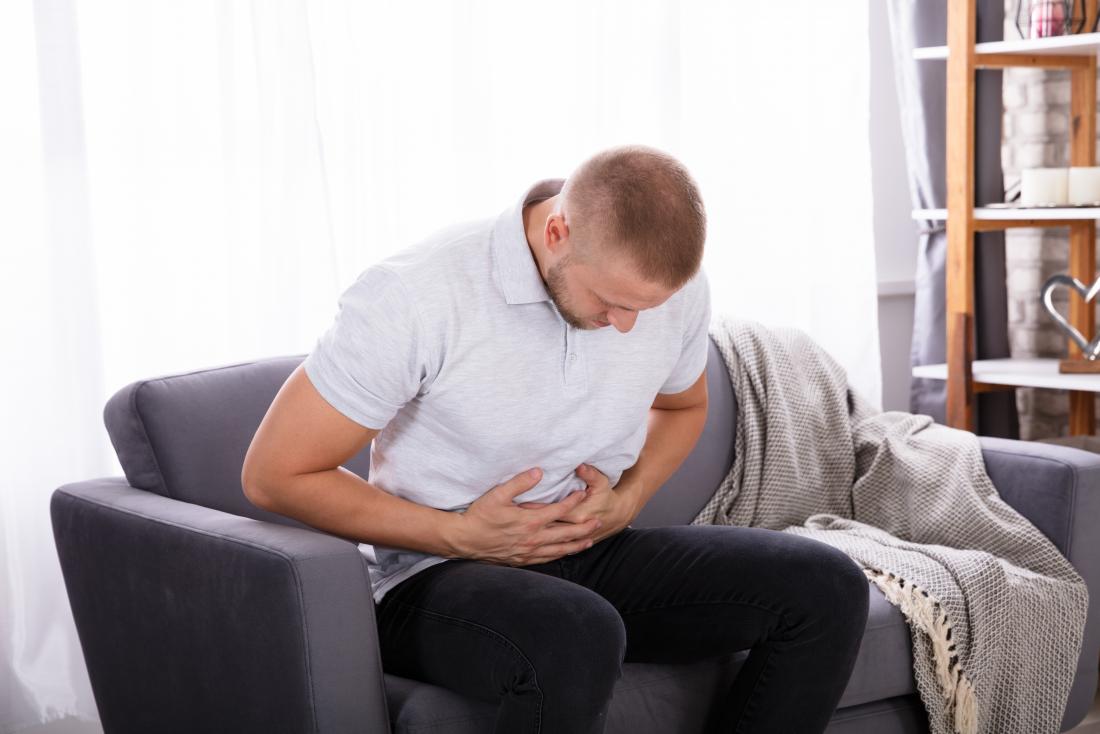It may also result from stress or chronic conditions, such as irritable bowel syndrome (IBS).
Here we describe some common causes of abdominal pain and diarrhea.
Causes
Diarrhea may be acute and occur suddenly, or chronic and develop slowly and last for a few days.
Some of the most common causes of abdominal pain and acute or chronic diarrhea include:
1. Infection

A viral infection may cause abdominal pain and diarrhea.
Diarrhea may result from a bacterial or viral infection of the stomach and bowel, which doctors call gastroenteritis.
People may get bacterial gastroenteritis by eating or drinking contaminated food or water. Symptoms usually occur within a few hours or days of consuming the contaminated food.
People may also contract viral gastroenteritis, which some people call stomach flu, from someone who has the infection.
Symptoms typically go away without treatment after a few days in both cases. People can try home remedies, such as drinking plenty of fluids, resting, and taking over-the-counter medications to ease discomfort.
Parasitic infections can also cause acute diarrhea and abdominal pain. This type of infection often clears up within a few weeks. Persistent outbreaks may require medical treatment.
2. Reactions to food
Something a person has eaten or drunk can potentially cause diarrhea, abdominal pain, and other types of stomach problems. Symptoms typically occur for short periods and will usually go away a few hours after eating.
Diarrhea after eating may have causes including:
- sudden changes in diet
- eating rich, fatty foods
- food sensitivities
- celiac disease, where the body cannot break down gluten, a protein found in wheat, rye, and barley
More than 20 percent of people experience food sensitivities, according to some research.
It is not always clear why diarrhea occurs after eating. Keeping a food diary can help. Once people know which foods are causing the problem, they can address it.
Remedies may include introducing new foods and dietary changes slowly, eating fewer rich meals, and limiting or avoiding trigger foods. People with celiac disease will need to remove gluten from their diet permanently.
3. Indigestion and overeating
Overeating can result in indigestion, diarrhea, and stomach ache because the digestive system struggles to deal with large amounts of food.
Both adults and children can experience the side effects of overeating, but children may be more likely to do so. This is because children cannot always differentiate between feeling hungry and feeling full.
To avoid overeating, people can:
- practice portion control and measure out foods
- fill up on high-fiber, low-calorie options, such as vegetables
- take the time to chew food thoroughly
Another helpful technique is mindful eating, which involves paying attention to the taste and texture of each bite of food. This includes avoiding distractions, such as television, during mealtimes.
4. IBS
Persistent diarrhea can suggest a chronic condition, such as IBS. This condition does not damage the digestive tract but may cause symptoms including:
- diarrhea
- stomach cramps
- bloating
- gas
According to the National Institute of Diabetes and Digestive and Kidney Diseases (NIDDK) about 12 percent of people in the United States have IBS. The majority are female.
There is no cure, but people can manage their symptoms by:
- reducing stress
- making dietary changes
- getting enough good quality sleep
- drinking plenty of liquids
- exercising
- taking supplements
- using medications
5. Inflammatory bowel disease
Inflammatory bowel disease (IBD) refers to a group of conditions that affect the bowel, including Crohn’s disease and ulcerative colitis. According to the Centers for Disease Control and Prevention (CDC), up to 1.3 million people in the United States have IBD.
Symptoms include:
- diarrhea
- fatigue
- abdominal pain
- bloody stool
- weight loss
IBD may result in damage to the digestive tract, unlike IBS. It is therefore essential that people with the condition manage their symptoms.
Treatment aims to reduce the inflammation that causes bowel damage and digestive symptoms. Options include medication, supplements, dietary changes, and surgery.
6. Stress

Art therapy may help reduce stress and anxiety.
Stress and anxiety can stimulate bowel movements, which may result in diarrhea.
Stress may also play a role in the development of IBS or make symptoms worse.
There is a link between the brain and the gut, which may explain why stress can lead to digestive problems.
For example, occupational stress may stimulate the gastric response.
People can reduce stress by trying:
- meditation and mindfulness
- regular exercise
- deep breathing techniques
- art or music therapy
People should see a doctor or mental health professional who can recommend medications, therapy, or a combination of both for persistent or severe stress.
6. Medications and alcohol
Too much alcohol can interfere with digestion and lead to stomach pain, diarrhea, vomiting, or other symptoms. People might consider limiting alcohol intake to avoid these issues.
The U.S. Dietary Guidelines for Americans lists moderate alcohol consumption as up to 1 drink daily for females and up to 2 drinks daily for males. People should aim to avoid alcohol for several days per week.
Some medications can also cause stomach problems, with many medicines listing diarrhea as a side effect.
Drugs that may cause diarrhea include:
Diarrhea sometimes goes away after a few days of using a new medication as the body adjusts. If diarrhea persists for several days after beginning a new drug, people should contact their doctor who may suggest an alternative.
7. Pregnancy
Pregnant people often experience diarrhea and other bowel changes, potentially due to hormonal and structural changes in the body.
Changes in dietary habits and new food sensitivities can also cause diarrhea during pregnancy.
Contact a doctor for a check-up and advice if diarrhea persists for more than a few days during pregnancy.
Less common causes
Constant or severe diarrhea can suggest a serious medical issue, especially if blood is present.
Other potential causes of abdominal pain and diarrhea include:
When to see a doctor
People with diarrhea and abdominal pain should see a doctor if symptoms:
- are severe
- get increasingly worse
- last more than a few days
- occur in infants, older adults, or people with weakened immune systems
- reoccur regularly
See a doctor immediately if diarrhea occurs with:
- black, tarry, or bloody stool
- confusion
- difficulty speaking
- fever
- frequent nausea or vomiting
- irritability
- jaundice, yellowing of the skin or the whites of the eyes
- rapid heart rate
- seizures
- symptoms of dehydration, such as dark urine, thirst, dry mouth, and fatigue
- vision problems
Prevention

Eating healthfully and not overeating can help prevent abdominal pain and diarrhea.
Preventing all cases of abdominal pain and diarrhea is impossible.
However, the following tips may reduce the likelihood of developing symptoms.
- eat a healthful diet
- do not eat too many fatty foods.
- avoid food intolerances
- limit alcohol intake
- avoid overeating by measuring out food portions
- reduce stress and get enough sleep
- maintain proper hydration
- avoid contact with people that have stomach flu.
- practice good hygiene when preparing food and store food correctly
- take precautions when traveling to regions where food poisoning is prevalent
- speak to a doctor about the side effects of medications, and ask about alternatives
- treat chronic conditions, such as IBS and IBD
Another tip to prevent developing abdominal pain and diarrhea is to take probiotic supplements, which research suggests may help prevent traveler’s diarrhea and antibiotic-associated diarrhea.
A 2016 study in the journal Medicine suggests the risk of traveler’s diarrhea could decrease by 8 percent and antibiotic-associated diarrhea by 52 percent when using probiotics.
Takeaway
The most likely causes of abdominal pain and diarrhea include:
- infections
- food-related issues
- medical conditions, such as IBS
In cases of acute diarrhea, symptoms usually subside after a few days. Chronic conditions require long-term management to control symptoms.
People should see a doctor if they continue to have diarrhea after a week. They should seek immediate medical attention if fever and other symptoms accompany the loose stools, or if diarrhea occurs in infants or older adults.
